I completed and submitted Regeneration, the 3rd book of the ®Evolution trilogy, a week ago. You would think that means I now have lots of time to attend to neglected things like social media updates and blogging, but oh no – because so much has been neglected over the past few weeks and months (company accounts! bills! VAT returns!) that I am racing to catch up before the end of December arrives and turns me into a pumpkin. Not to mention more pleasurable offline pursuits like friends in town for Christmas and other delights of the season. So for now I’m cheating by reposting a piece I wrote for the Jo Fletcher Books Christmas 2014 Advent Calendar about the significance of Christmas in Gemsigns. (Which means, incidentally, that if anyone out there’s looking for a very last-minute bookish gift idea that has some relevance to the the week we’re in … without necessarily being, y’know, a ‘Christmas Story’ in the traditional sense … Blackwell’s. Forbidden Planet. Foyles. Waterstones. And quite possibly an independent bookshop near you.)
Here you go. I will be back with something new and original soon … possibly on how it feels to have finished! writing! a trilogy! Until then, compliments of the season.
When is a Christmas story not a Christmas story?
I’ve been thinking about this on and off for a few years now, ever since I finished writing Gemsigns. Although the events of the novel lead up to and conclude on Christmas Day – a fact which is hugely significant within the narrative logic of the book – you would never know from the jacket blurb or the majority of the reviews that it has anything to do with Christmas.
That’s fair enough, as the narrative is not constructed to reinforce the traditional religiosity of the season, nor the contemporary commerciality with which we are all familiar. The novel is, however, very interested in the construction, interpretation and evolution of myth. Part of what I was interested in when I wrote it is how the founding mythologies and legends of a future civilisation might develop, and how the cultural standards with which we here in the twenty-first century are familiar might morph and shift and adapt themselves to new ways of thinking and being. I don’t buy the idea that ancient cultural touchstones and archetypes simply disappear under an avalanche of techno-advancement, or that they survive only as a sort of throwback primitivism. I think that in the same way the pagan festivals of the winter solstice and the spring equinox were co-opted and adapted into Christmas and Easter, these cyclical commemorations, these holy-days will adapt and evolve again. One of the many things I was trying to achieve with Gemsigns was an imagining of that sort of deep cultural evolution.
Gemsigns opens with a short introductory passage related by an omniscient narrator who speaks in the riddling, mythopoeic voice of legends, epics, and sacred texts:
When describing a circle one begins anywhere. Each step precedes and succeeds with no greater or less meaning: the tale they tell remains unvaried.
The narrator then tells of a hunted child fleeing unnamed but terrifying pursuers; an escape whose end is indeterminate. Told in the present tense, the subsequent context makes it clear that this incident has occurred in the story’s past, forming an in-the-beginning backdrop to a tale that unfolds in our future: in a London that has survived the apocalypse of a generational pandemic and the dystopia of the resulting slave state. The omniscient voice is gone now, for in the confusion that follows few people are sure of anything, and absolutely no one knows everything.
Day by day over a winter week, the reader witnesses events from the perspective of a range of characters who identify with different political, social, economic and, yes, religious camps. But it is only on the sixth of these days that the reader learns precisely which week they are witness to: for the sixth day, the day of reckoning, is Christmas Eve and the seventh day, the day of resolution, is Christmas.
Within the world of the story these commemorations are no longer the common knowledge of our own era. They are significant to some of the characters, and that significance drives their actions within the narrative, but they no longer matter to society as a whole. Christmas Eve and Christmas Day are historical artefacts, observed only by a minority and neither commercially nor socially important.
This is not, then, a Christmas story. Except it kind of is. Among its many characters and influencers are a small child of great significance to the world he inhabits, a powerful bureaucracy (and outlaw theocracy) who are threatened by what he represents, and a band of second-class non-citizens struggling to assert their own humanity and their right to the same freedoms, privileges and responsibilities as everyone else. Their ability to do so is both compromised and symbolised by their commitment to protect and cherish the child, whose existence has the potential to undermine the system under which they are oppressed.
The fact that these conflicts play out to their conclusion over Christmas was not merely for the convenience of the plot. I very consciously wanted to construct a new cultural paradigm within a science-fictional setting. Science fiction rarely, it seems to me, takes the past as seriously as it does the future (one could make the parallel argument that fantasy rarely takes the future as seriously as it does the past, but that is a subject for another essay); it rarely acknowledges how much of its future-world-building must perforce be influenced by the full depth and richness of what has gone before. I thought it would be interesting to use a holy-day of great historical and cultural significance for the unveiling of a new revelation; to take the date that gave us anno domini and from it launch a new era. What happens in Gemsigns at Christmas is what that day, in that possible future, will be remembered for.
This is not, of course, something that religious traditionalists – either within the world of the book or out here in the ‘real’ world – are likely to be pleased about. They generally cannot countenance the notion that the way people live and the things they believe can, must, should be constantly subject to question; subject to change. But I like to think that the legendary rebel whose life informed and whose death founded our own era, if he ever existed and was as good and brave a man as we imagine, would approve.








